新概念一(72-100课)重点词组句型教学提纲
(完整)新概念第一册lesson1-72重要句型知识点及语法点,推荐文档
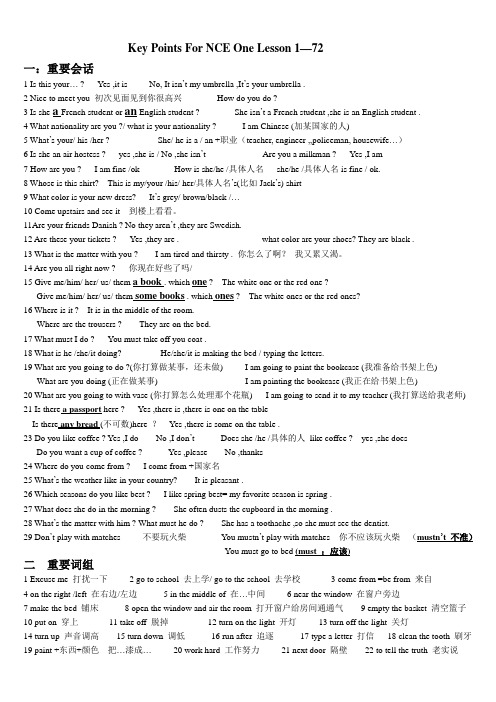
Key Points For NCE One Lesson 1—72一:重要会话1 Is this your… ? Yes ,it is No, It isn’t my umbrella ,It’s your umbrella .2 Nice to meet you 初次见面见到你很高兴How do you do ?3 Is she a French student or an English student ? She isn’t a French student ,she is an English student .4 What nationality are you ?/ what is your nationality ? I am Chinese (加某国家的人)5 What’s your/ his /her ? She/ he is a / an +职业(teacher, engineer ,,policeman, housewife…)6 Is she an air hostess ? yes ,she is / No ,she isn’t Are you a milkman ? Yes ,I am7 How are you ? I am fine /ok How is she/he /具体人名she/he /具体人名is fine / ok.8 Whose is this shirt? This is my/your /his/ her/具体人名’s(比如Jack’s) shirt9 What color is your new dress? It’s grey/ brown/black /…10 Come upstairs and see it 到楼上看看。
11Are your friends Danish ? No they aren’t ,they are Swedish.12 Are these your tickets ? Yes ,they are . what color are your shoes? They are black .13 What is the matter with you ? I am tired and thirsty . 你怎么了啊?我又累又渴。
新概念1 61-72课 单词 重点词组 重要句型
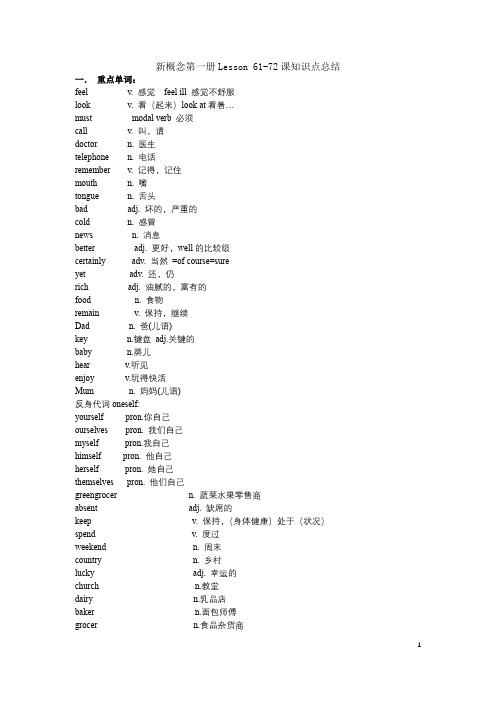
新概念第一册Lesson 61-72课知识点总结一.重点单词:feel v. 感觉feel ill 感觉不舒服look v. 看(起来)look at看着…must modal verb 必须call v. 叫,请doctor n. 医生telephone n. 电话remember v. 记得,记住mouth n. 嘴tongue n. 舌头bad adj. 坏的,严重的cold n. 感冒news n. 消息better adj. 更好,well的比较级certainly adv. 当然=of course=sureyet adv. 还,仍rich adj. 油腻的,富有的food n. 食物remain v. 保持,继续Dad n. 爸(儿语)key n.键盘adj.关键的baby n.婴儿hear v.听见enjoy v.玩得快活Mum n. 妈妈(儿语)反身代词oneself:yourself pron.你自己ourselves pron. 我们自己myself pron.我自己himself pron. 他自己herself pron. 她自己themselves pron. 他们自己greengrocer n. 蔬菜水果零售商absent adj. 缺席的keep v. 保持,(身体健康)处于(状况)spend v. 度过weekend n. 周末country n. 乡村lucky adj. 幸运的church n.教堂dairy n.乳品店baker n.面包师傅grocer n.食品杂货商星期几:Tuesday n. 星期二Wednesday n. 星期三Thursday n. 星期四Friday n. 星期五Saturday n. 星期六Sunday n. 星期日was v.是(am的一般过去时)were v.是(are的一般过去时)year n.年race n. 比赛town n. 城镇crowd n.人群stand v.站立,忍受exciting adj. 使人激动的(修饰物) excited adj.兴奋的,激动的(修饰人)just adv.正好,恰好finish n. 结尾,结束v.完成winner n.获胜者win v.获胜,赢得behind prep.在…之后stationer n.文具商awful adj. 让人讨厌的,坏的telephone v. & n. 打电话;电话time n. 次(数);时间answer v. 接(电话);回答last adj. 最后的,前一次的tonight 今晚phone n. 电话(=telephone)again adv. 又一次地say (said) /sed/ v. 说said(say的过去时)说二. 重点词组:call the doctor请医生call sb. up给某人打电话remember to do sth. 记得去做某事remember doing sth. 记得做过某事be bad for对…有坏处have a bad cold患重感冒good news好消息a piece of news 一则新闻stay in bed躺在床上feel ill 感觉不舒服take some medicine吃药see a doctor看医生have a temperature发烧take one’s temperature量某人的体温get up 起床rich food 油腻的食物play with… 玩…东西make a noise 制造噪音drive quickly 快速地开车lean out of…身体探出…the key to the door 门钥匙the key to the problem 问题的答案hear sb. do sth. 听见某人做过某事hear sb. doing sth. 听见某人正在做某事enjoy oneself 某人玩得开心enjoy sth./ doing sth. 喜欢某物/喜欢做某事by oneself 独自,独立at the greengrocer’s 在蔬菜水果店be absent from school 没去上学for the weekend 整个周末at the weekend 在周末at the baker’s 在面包店at the grocer’s 在杂货店at the stationer’s 在文具店win/lose a race 赢/输比赛in the crowd 在人群中crowd into… 涌入、挤进an exciting race 激动人心的比赛finish sth./doing sth. 完成做某事all the time 一直on time 按时,准时in time 及时answer the phone 接电话answer the door 应声开门answer a letter 回信on one’s way home 在某人回家的路上last night 昨夜again and again 屡次地,再三地三. 重点知识点:1.must do sth必须做某事,You mustn't do …你不准做某事,相当于祈使句D on’t do…对must引导的一般疑问句否定回答用you needn't2.感官动词➕形容词表示主观感受3.remember to do和remember doing的区别4.have ➕疾病的用法5.复习must的用法,强调must引导的一般疑问句的否定回答用:No,sb. needn't6.remain in bed=keep in bed=stay in bed7.keep ➕名词(代词)➕形容词,表示保持某种状态,例如keep quiet,keep the eggswarm8.do sth for ➕一段时间,表示做某事做了一段时间,如I sleep for 6 hours everyday9.复习can和must的用法,must的否定句是mustn’t,否定回答是needn’t.10.enjoy +oneself反身代词(好好玩吧),=have a good time. 反身代词的用法,详见PPT11.关于年龄的表达:基数词+years+old12.be动词的一般过去时,am改成was,are改成were13.when和where的用法14.日期和时间的表达,以及序数词15.一般过去时的there be句型,表示过去存在的状态。
新概念英语第一册语法每节课重点总结
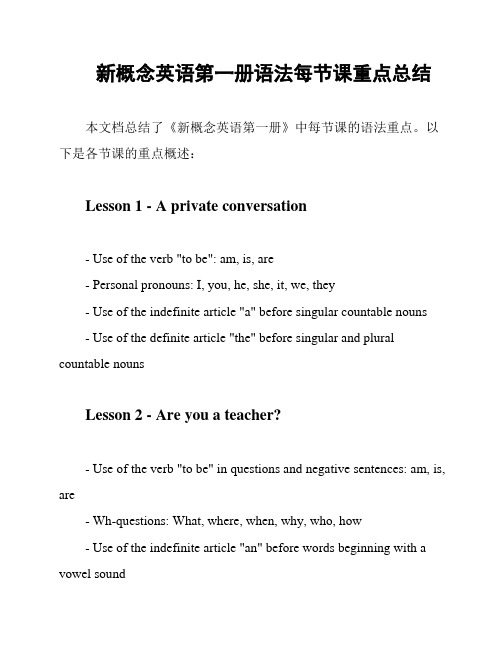
新概念英语第一册语法每节课重点总结本文档总结了《新概念英语第一册》中每节课的语法重点。
以下是各节课的重点概述:Lesson 1 - A private conversation- Use of the verb "to be": am, is, are- Personal pronouns: I, you, he, she, it, we, they- Use of the indefinite article "a" before singular countable nouns- Use of the definite article "the" before singular and plural countable nounsLesson 2 - Are you a teacher?- Use of the verb "to be" in questions and negative sentences: am, is, are- Wh-questions: What, where, when, why, who, how- Use of the indefinite article "an" before words beginning with a vowel soundLesson 3 - The first lesson- Use of the present simple tense: positive and negative sentences - Use of the frequency adverbs: always, usually, often, sometimes, never- Use of the preposition "at" to talk about specific timesLesson 4 - Please send me a card- Use of the imperative form: positive and negative sentences- Use of the infinitive form to give instructions: "to + base verb"- Use of the expression "please" to make polite requestsLesson 5 - An exciting trip- Use of the present continuous tense: positive and negative sentences- Use of the verb "to go" in present continuous tense: am/is/are + going- Use of the prepositions "to" and "at" to talk about destinations以上是《新概念英语第一册》各节课的语法重点总结。
(完整版)新概念第一册lesson1-72重要句型知识点及语法点
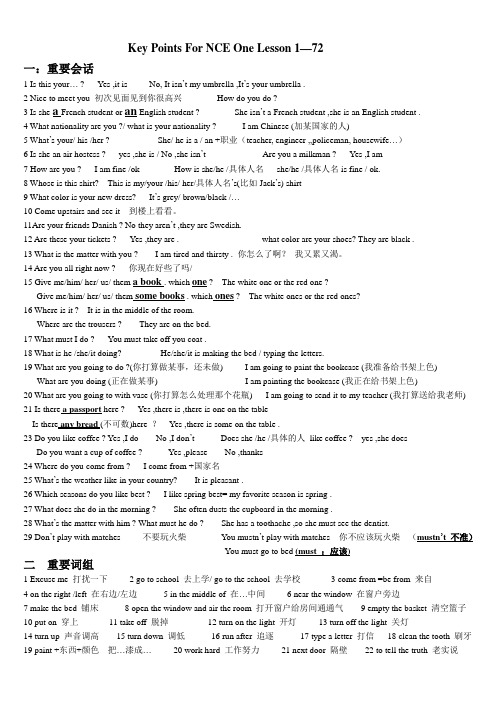
Key Points For NCE One Lesson 1—72一:重要会话1 Is this your… ? Yes ,it is No, It isn’t my umbrella ,It’s your umbrella .2 Nice to meet you 初次见面见到你很高兴How do you do ?3 Is she a French student or an English student ? She isn’t a French student ,she is an English student .4 What nationality are you ?/ what is your nationality ? I am Chinese (加某国家的人)5 What’s your/ his /her ? She/ he is a / an +职业(teacher, engineer ,,policeman, housewife…)6 Is she an air hostess ? yes ,she is / No ,she isn’t Are you a milkman ? Yes ,I am7 How are you ? I am fine /ok How is she/he /具体人名she/he /具体人名is fine / ok.8 Whose is this shirt? This is my/your /his/ her/具体人名’s(比如Jack’s) shirt9 What color is your new dress? It’s grey/ brown/black /…10 Come upstairs and see it 到楼上看看。
11Are your friends Danish ? No they aren’t ,they are Swedish.12 Are these your tickets ? Yes ,they are . what color are your shoes? They are black .13 What is the matter with you ? I am tired and thirsty . 你怎么了啊?我又累又渴。
(完整版)新概念1-144课语法和重点总结,推荐文档
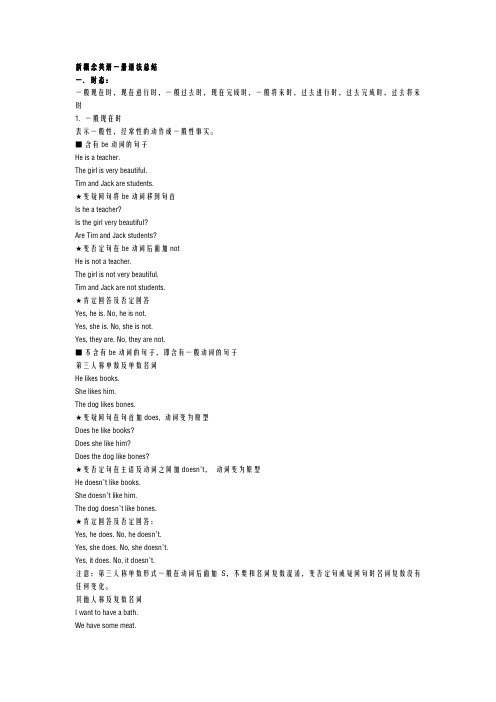
新概念英语一册语法总结一.时态:一般现在时,现在进行时,一般过去时,现在完成时,一般将来时,过去进行时,过去完成时,过去将来时1. 一般现在时表示一般性,经常性的动作或一般性事实。
■含有be动词的句子He is a teacher.The girl is very beautiful.Tim and Jack are students.★变疑问句将be动词移到句首Is he a teacher?Is the girl very beautiful?Are Tim and Jack students?★变否定句在be动词后面加notHe is not a teacher.The girl is not very beautiful.Tim and Jack are not students.★肯定回答及否定回答Yes, he is. No, he is not.Yes, she is. No, she is not.Yes, they are. No, they are not.■不含有be动词的句子,即含有一般动词的句子第三人称单数及单数名词He likes books.She likes him.The dog likes bones.★变疑问句在句首加does, 动词变为原型Does he like books?Does she like him?Does the dog like bones?★变否定句在主语及动词之间加doesn’t,动词变为原型He doesn’t like books.She doesn’t like him.The dog doesn’t like bones.★肯定回答及否定回答:Yes, he does. No, he doesn’t.Yes, she does. No, she doesn’t.Yes, it does. No, it doesn’t.注意:第三人称单数形式一般在动词后面加S,不要和名词复数混淆,变否定句或疑问句时名词复数没有任何变化。
新概念英语一册语法1-72总结
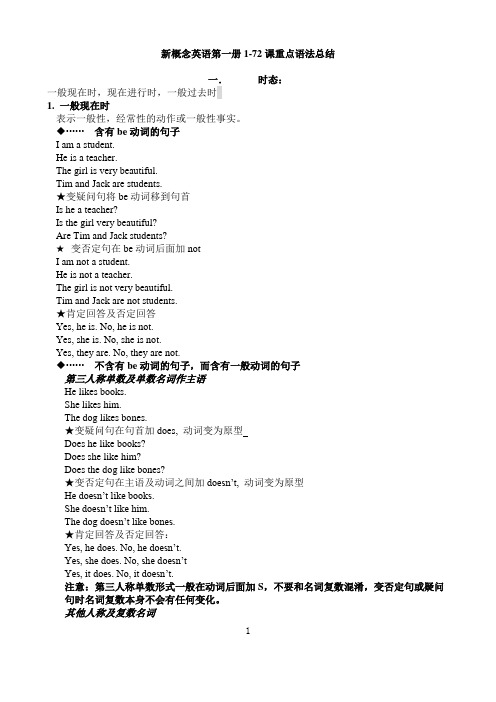
新概念英语第一册1-72课重点语法总结一.时态:一般现在时,现在进行时,一般过去时1. 一般现在时表示一般性,经常性的动作或一般性事实。
◆∙∙∙∙∙∙ 含有be动词的句子I am a student.He is a teacher.The girl is very beautiful.Tim and Jack are students.★变疑问句将be动词移到句首Is he a teacher?Is the girl very beautiful?Are Tim and Jack students?★变否定句在be动词后面加notI am not a student.He is not a teacher.The girl is not very beautiful.Tim and Jack are not students.★肯定回答及否定回答Yes, he is. No, he is not.Yes, she is. No, she is not.Yes, they are. No, they are not.◆∙∙∙∙∙∙ 不含有be动词的句子,而含有一般动词的句子第三人称单数及单数名词作主语He likes books.She likes him.The dog likes bones.★变疑问句在句首加does, 动词变为原型Does he like books?Does she like him?Does the dog like bones?★变否定句在主语及动词之间加doesn’t, 动词变为原型He doesn’t like books.She doesn’t like him.Th e dog doesn’t like bones.★肯定回答及否定回答:Yes, he does. No, he doesn’t.Yes, she does. No, she doesn’tYes, it does. No, it doesn’t.注意:第三人称单数形式一般在动词后面加S,不要和名词复数混淆,变否定句或疑问句时名词复数本身不会有任何变化。
新概念英语一册教学大纲

新概念英语第一册教学大纲一、知识要点上半部分(第1~72课)1.音标:2.字母:3.词汇:掌握550个基本词汇(包括称谓、日常用品、食物、颜色、疾病、国家、国籍、天气、季节、月份、星期等)。
4.简单句的六种基本句型:①主语(Subject)+谓语(vi)如:Peterworksveryhard.②主语(Subject)+系动词(Link.V)+表语(Predicate)如:Thequestionsaretoodifficult.③主语(Subject)+谓语(vt)+宾语(Object)如:Weusuallyreadnewspaperinthelivingroom.④主语(Subject)+谓语(vt)+间接宾语(OI)+直接宾语(OD)或:主语(Subject)+谓语(vt)+直接宾语(OD)+to/for+间接宾语(OI)如:Isenthimapresent.Isentapresenttohim.⑤主语(Subject)+谓语(vt)+宾语(Object)+补语(Complement)如:Youshouldkeeptheroomcleanandtidy.⑥T herebe+主语(Subject)+其它如:Thereisavaseonthetablenearthewindow.5.时态:①一般现在时:⑴概念:表示经常、反复发生的动作或行为及现在的某种状况。
⑵常与often,sometimes,always,usually等频率副词连用,还与everymorning/day/week,onWednesday,inthemorning/afternoon/evening等时间状语连用。
⑶基本结构:动词原形(如主语为第三人称单数,动词要加s或es)⑷否定形式:am/is/are+not;若谓语动词为行为动词,则在其前加don't,如主语为第三人称单数,则用doesn't,同时还原行为动词。
新概念英语第1册第71-72课重点语法
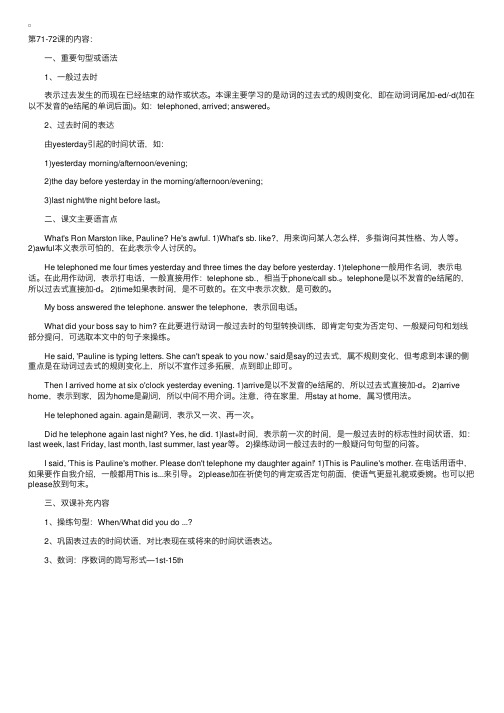
第71-72课的内容: ⼀、重要句型或语法 1、⼀般过去时 表⽰过去发⽣的⽽现在已经结束的动作或状态。
本课主要学习的是动词的过去式的规则变化,即在动词词尾加-ed/-d(加在以不发⾳的e结尾的单词后⾯)。
如:telephoned, arrived; answered。
2、过去时间的表达 由yesterday引起的时间状语,如: 1)yesterday morning/afternoon/evening; 2)the day before yesterday in the morning/afternoon/evening; 3)last night/the night before last。
⼆、课⽂主要语⾔点 What's Ron Marston like, Pauline? He's awful. 1)What's sb. like?,⽤来询问某⼈怎么样,多指询问其性格、为⼈等。
2)awful本义表⽰可怕的,在此表⽰令⼈讨厌的。
He telephoned me four times yesterday and three times the day before yesterday. 1)telephone⼀般⽤作名词,表⽰电话。
在此⽤作动词,表⽰打电话,⼀般直接⽤作:telephone sb.,相当于phone/call sb.。
telephone是以不发⾳的e结尾的,所以过去式直接加-d。
2)time如果表时间,是不可数的。
在⽂中表⽰次数,是可数的。
My boss answered the telephone. answer the telephone,表⽰回电话。
What did your boss say to him? 在此要进⾏动词⼀般过去时的句型转换训练,即肯定句变为否定句、⼀般疑问句和划线部分提问,可选取本⽂中的句⼦来操练。
He said, 'Pauline is typing letters. She can't speak to you now.' said是say的过去式,属不规则变化,但考虑到本课的侧重点是在动词过去式的规则变化上,所以不宜作过多拓展,点到即⽌即可。
新概念一Lesson1-72重点
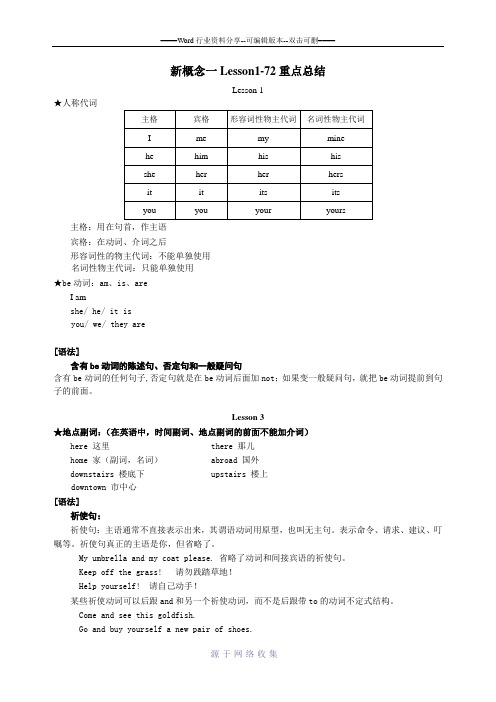
新概念一Lesson1-72重点总结Lesson 1★人称代词主格:用在句首,作主语宾格:在动词、介词之后形容词性的物主代词:不能单独使用名词性物主代词:只能单独使用★be动词:am、is、areI amshe/ he/ it isyou/ we/ they are[语法]含有be动词的陈述句、否定句和一般疑问句含有be动词的任何句子,否定句就是在be动词后面加not;如果变一般疑问句,就把be动词提前到句子的前面。
Lesson 3★地点副词:(在英语中,时间副词、地点副词的前面不能加介词)here 这里there 那儿home 家(副词,名词)abroad 国外downstairs 楼底下upstairs 楼上downtown 市中心[语法]祈使句:祈使句:主语通常不直接表示出来,其谓语动词用原型,也叫无主句。
表示命令、请求、建议、叮嘱等。
祈使句真正的主语是你,但省略了。
My umbrella and my coat please. 省略了动词和间接宾语的祈使句。
Keep off the grass! 请勿践踏草地!Help yourself! 请自己动手!某些祈使动词可以后跟and和另一个祈使动词,而不是后跟带to的动词不定式结构。
Come and see this goldfish.Go and buy yourself a new pair of shoes.去给自己买双新鞋吧。
Wait and see. 等着瞧吧。
倒装句:here is 是简单的倒装句,be 动词放在 here 的后面,这个句式就可以成为简单的倒装句式。
My ticket is here. 我的票在这。
Here is my ticket. / Here's my ticket.Lesson 5[语法]冠词:冠词数量上表示“一个”。
冠词一共有三个,分为不定冠词和定冠词。
1、a, an 是不定冠词:可数名词单数前面必须要用不定冠词a 用在以辅音音素开头的名词前面,an 用于以元音音素(元音发音的单词)开头的名词前面a pen an apple an umbrella an egg an hour a university2、the 是定冠词,表示特指,有两种发音:[❆☜]、[❆♓],以元音发音开头的单词前面读[❆♓]。
(完整版)新概念第一册每一课重点的总结,推荐文档

2,第三人称单数的疑问形式,注意助动词的运用。
6,L53 的课文及单词要求背诵,L54 的生词要求认读。
55-56
55,the Sawyer family
1,总结第三人称单数动词加后缀的情况。
56,what do they usually 2,一天中各个时间段的理解和掌握
do?
3,重点词汇:arrive,home,together,usually
45,the boss’s letter. 45-46 46,can you…?
1, can you…? 句型的熟练掌握。 2, 连词 but 一词表转折意义。‘ 3,单词及课文要求背诵。
47,a cup of coffee
1, 理解和掌握 Do you like ..?和 Do you want..?并正确回答
10, Look at…
How are you?(朋友或相识的人之间见面时的寒暄话)
2,如何问候他人(How is …?)
9-10
3,nice to see you .(见面时的客气话)
4,Look at…(看…)。
5,第三人称代词与 be 动词的缩写。
6,L9、10 的单词及 L9 的课文要求背诵。(L10 的单词是形容词,且相互之间是反义词)
15,Your passports, please 1, Is this your…?的复数形式 Are these your…?及 What colour are your…..?
16,Are you…?
2,Are you…?你是…吗?(国籍的询问)
15-16
3,名词变复数规则的初步认知和掌握。
4,基本颜色的巩固。
1, 重点句型: Are you …?/ What’s your job?/ What nationality are you?
新概念1-72课知识点
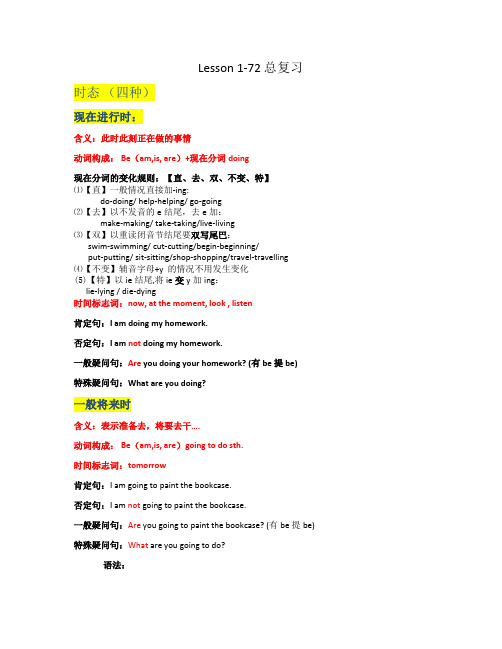
Lesson 1-72 总复习时态(四种)现在进行时:含义:此时此刻正在做的事情动词构成: Be(am,is, are)+现在分词doing现在分词的变化规则:【直、去、双、不变、特】⑴【直】一般情况直接加-ing:do-doing/ help-helping/ go-going⑵【去】以不发音的e结尾,去e加:make-making/ take-taking/live-living⑶【双】以重读闭音节结尾要双写尾巴:swim-swimming/ cut-cutting/begin-beginning/put-putting/ sit-sitting/shop-shopping/travel-travelling⑷【不变】辅音字母+y 的情况不用发生变化(5)【特】以ie结尾,将ie变y加ing:lie-lying / die-dying时间标志词:now, at the moment, look , listen肯定句:I am doing my homework.否定句:I am not doing my homework.一般疑问句:Are you doing your homework? (有be 提be)特殊疑问句:What are you doing?一般将来时含义:表示准备去,将要去干….动词构成: Be(am,is, are)going to do sth.时间标志词:tomorrow肯定句:I am going to paint the bookcase.否定句:I am not going to paint the bookcase.一般疑问句:Are you going to paint the bookcase? (有be 提be) 特殊疑问句:What are you going to do?语法:一般现在时含义:描述某种状态、规律性或客观事实。
例句:1. I go to school every day. (一般性)2. Peter usually brushes his teeth three times a day.(规律性)⒊ The sun rises in the east and sets in the west.(客观事实)动词:不变→主语非三单如:I read newspaper every day. .变化→主语为三单形式如:He reads newspaper every day.标志词: 1) 频率副词:all the time, always, usually, often, sometimes2) 时间标志词:every+时间, in the morning/afternoon/ evening, at night/noonI. 带动词的句子:主语非三单肯定句:I like apples.否定句:I don’t like apples. “见动词,找助动”口诀一般疑问句: Do you like apples? “无be无情,就借助”特殊疑问句:What do you like?主语为三单:肯定句:Mr. Sawyer usually watches TV at night .否定句:Mr. Sawyer doesn’t usually watch TV at night . “见动词,找助动”口诀一般疑问句: Does Mr. Sawyer usually watch TV at night? “无be无情,就借助”特殊疑问句:What does Mr. Sawyer usually do at night?When does Mr. Sawyer usually watch TV ?Ⅱ.Ⅰ.带有Be动词句子:肯定句:I am a student.否定句: I am not a student.在Be动词后加NOT即可一般疑问句:Are you a student? ”有be 提be”特殊疑问词:What are you? 特殊疑问词+ 一般疑问句一般过去时含义:描述过去发生的动作,已经在过去结束和终止,成为过去的事动词:动词过去式变化规则:⑴【直】一般情况加ed:help-helped / look-looked / watch-watched⑵【去】以不发音的e结尾:live-lived / love-loved /hope-hoped⑶【双】以重读闭音节词结尾: stop-stopped / shop-shopped / plan-planned以元音+ y结尾,直接加ed: play- played / enjoy-enjoyed⑷【改】以辅音+y结尾,去y加ied: carry-carried/ cry-cried /study-studied⑸【特】不规则变化,详见书中P179和P183时间标志词: yesterday, last…,…ago, just now, in the past, in 2000句型变化:肯定句:I went to the zoo yesterday.否定句:I did go to the zoo yesterday. 借助动词did一般疑问句:Did you go to the zoo yesterday?特殊疑问句:What did you do yesterday?【特】带有Be动词句子,Be动词两种变化形式(was和were):肯定句:Lily was a teacher two years ago.否定句:Lily wasn’t a teacher two years ago.一般疑问句: Was Lily a teacher two years ago? “将Be动词was ,were提前”特殊疑问句即:What was Lily two years ago? 特殊疑问词 + Be+ 主语 +其他其他语法:1.选择疑问句:前升后降调;不用yes 或no 回答含特殊疑问句的选择疑问句:What do you want, beef or lamb? Beef, please.含一般疑问句的选择疑问句:Do you want beef or lamb?lamb, please.2.情态动词1)must 必须: What must I do?2)can 能肯定句: I can make the tea.否定句: I can’t make the tea. “情态动词后直接加not 改否定”一般疑问句:Can you make the tea? “有情提情”特殊疑问句:What can you do?3.there be 句型:某处有(存在)某物There is a(an) + 单数可数名词/(some)不可数名词 + 地点(介词短语)There is a book on the floor. / There is some water in the bottle.There are + (some)复数可数名词+ 地点(介词短语)There are some books on the floor.4.不可数名词:a piece of cheese,a loaf of bread,a bar of soap,a bar of chocolate,a pond of sugar,a tin of tobacco,a bottle of orange juice5. 时间介词年和月共用in,星期日期共用on,具体时刻用at,季节前面也用in,周末at 和on都可以。
(完整版)新一1-72课语法点总结
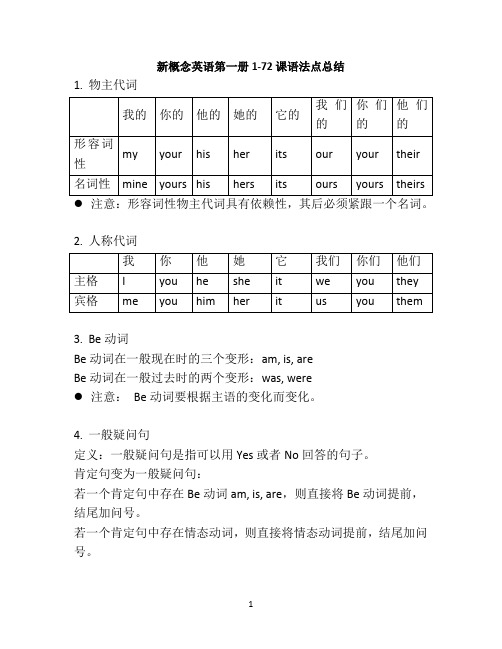
新概念英语第一册1-72课语法点总结1.物主代词2.人称代词3.Be动词Be动词在一般现在时的三个变形:am, is, areBe动词在一般过去时的两个变形:was, were●注意:Be动词要根据主语的变化而变化。
4.一般疑问句定义:一般疑问句是指可以用Yes或者No回答的句子。
肯定句变为一般疑问句:若一个肯定句中存在Be动词am, is, are,则直接将Be动词提前,结尾加问号。
若一个肯定句中存在情态动词,则直接将情态动词提前,结尾加问号。
若一个肯定句中存在实义动词,则直接在句首加助动词do/does/did,实义动词变原形,结尾加问号。
注意:一般疑问句一般读为升调。
例:Are you a teacher? 你是一名老师吗?肯定回答:Yes, I am. 否定回答:No, I am not.Do you like English? 你喜欢英语吗?肯定回答:Yes, I do. 否定回答:No, I don’t.5.特殊疑问句定义:不能用Yes或者No回答的句子。
构成:特殊疑问词+ 一般疑问句特殊疑问词:what(什么), when(何时), where(何地), who (谁), whom(谁宾格), whose(谁的), which(哪个), why(为什么), how(怎么样)口诀:非常八加一6.不定冠词a/an若单词是以“a, e, i, o”四个元音开头,其前面选用“an”;若单词是以元音字母“u”开头,视情况而定。
若其发音与“umbrella”中的“u”一致,则前面加“an”;若其发音与“university”中的“u”一致(即发字母本身音时),前面加“a”。
若单词是以辅音字母开头,一般前面用a。
特殊:an hour 一个小时;an honest boy 一个诚实的男孩若一个字母单独出现时,分如下情况:加an的字母:a, e, i, o(元音);x, r, s, l, n, f, m, h (辅音;口诀为“学而思送来那份美好”)例:There is an “m” in the word “umbrella”. 在单词umbrella里面有一个字母m。
新概念英语第一册72-144课重难点

NCE One Lesson 72 –144 key points1问路的几种方式:Can you tell me the way to …/ where is…/ How can I get to…2 lose one’s way 迷路/ ask sb the way 问路3 put…into 把…放进…/ put on 穿上/ put off延迟/ put down 写下,放下/put out 熄灭,播出/put up 张贴,建起4 take off 脱掉,起飞/take out 取出,擦掉/ take turns 轮流,替换/take part in 参加/take over 接收,接管5 be in fashion = fashionable流行的out of fashion 过时的6 I am afraid +that 句子I am afraid that I can’t come on time7 感官动词(feel. Sound, taste, look ,smell )+ 形容词The girl looks very lovely8 see the dentist 看牙医have an appointment with sb 与某人有约have a cold / have a fever / have a toothache 患感冒/发烧/牙疼9 介词与表时间的名词的搭配At +某一时刻:at night / at noon / at dawn(黄昏)/midnight(午夜/at present /at the moment此刻/at grocers’杂货店On : 表确定的某一天,生日,节日或某日的上下午晚上on Sunday/ on oct.1st/on Christmas eve /on the morning of children’s day /on my birthday/on a cold day .In +季节/年份/月份/早,下,晚上/ in the morning10 make a shopping list 写购物单go to grocers’去杂货店11 we haven’t got any tea or coffee at all 我们根本没有茶叶也没有咖啡。
新概念一(72-100课)重点词组句型说课材料

新概念一(72-100课)重点词组句型73-100课重点词组句型I 词组lose one’s way 迷路 say… to oneself 心中暗想 take out 拿出 in fashion 流行的,时髦的last week/month/year 上周、上个月、去年 the week/month/year before last 大上周、大上个月、前年have an appointment 有约 make a shopping list 写一张购物单a lot of= lots of 许多 at all (用在否定句尾)丝毫、一点、根本go to the grocer’s 去杂货店 have a bath 洗澡have dinner 吃晚饭 go on holiday 度假stay at home 呆在家 all the time 一直,始终just like…就像…一样 to tell you the truth 和你说实话吧be for sale 供出售、待售 be on sale 打折卖how long 多久、多长(用于现在完成时的句子中) not yet 还没有move to…搬家到… tomorrow moring/afternoon/evening 明天上午、下午、晚上tomorrow night 明天晚上 the day after tomorrow 后天the day after tomorrow in the moring/afternoon/evening 后天上午、下午、晚上the night after next 后天晚上 next-door neighbour 隔壁邻居收集于网络,如有侵权请联系管理员删除next week/month/year 下周、下个月、明年 the week/month/year after next 大下周、大下个月、后年return ticket 往返票 next door to 与..为邻had better 最好 in five hour’s time 五小时之后have a drink 喝点东西 plenty of 许多,大量in an hour’s time 一小时后 the other day 几天前belong to 属于 fall downstairs 从楼梯上摔下来II.句型1.She doesn’t know London very well. (149)2.Can you tell me the way to (149)3.Then he put his hand into his pocket and took out a phrasebook. (149)4.What size? (153)5.They were in fashion last year. (153)6.Do you have an appointment? (157)7.We haven’t got any meat at all. (161)8.He is upstairs. (165)9.I’ m nearly ready. (165)10.Excuse the mess. (169)11.Have you just been to the cinema? (173)12.I have never been there. (173)13.What is on? (173)14.When did you bring it to us? (177)15.They are still working on it (177)16.I believe that this house is for sale. (181)17.How long have you lived here? I’ve lived here for 20 years. (181)18.How much does this house cost? (181)19.It’s worth every penny of it . (181)20.Women always have the last word. (181)21.We’ ll all miss him (185)22.Please give him my regards. (185)收集于网络,如有侵权请联系管理员删除23.We had better go back to the station. (193)24.We have got plenty of time. (193)25.I left a suitcase on the train to London the other day. (197)26.This case does n’t belong to me! (197)III. 重点语法1.buy sb sth = buy sth for sb 注意用for2. a lot of =lots of + 可数名词、不可数名词均可,通常用在肯定句中many + 可数名词,通常用在疑问、否定句中much + 不可数名词,通常用在疑问、否定句中3.at all 用在否定句尾4.现在完成时5. already 常用于肯定、疑问句中;yet 常用于疑问、否定句尾,译为“还、已经”6. home 之前不加任何冠词和to 例如:go home, arrive home, stay at home 7. have been to 表示某人去过某地,现在已经回来了have gone to 表示某人去了某地,现在没有回来。
新概念英语第一册1_72课语法点总结
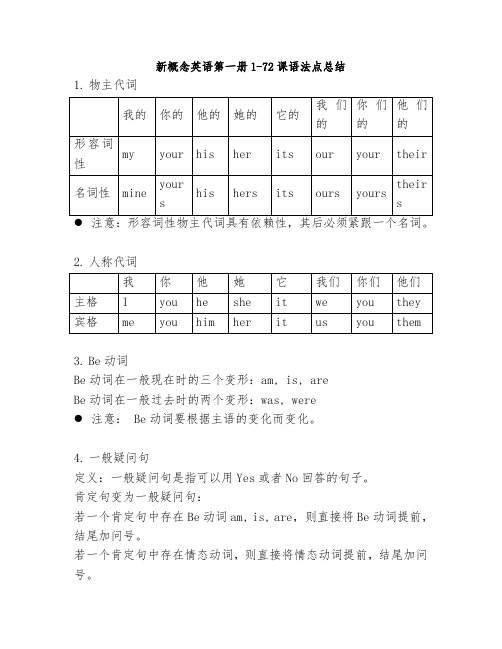
新概念英语第一册1-72课语法点总结1.物主代词2.人称代词3.Be动词Be动词在一般现在时的三个变形:am, is, areBe动词在一般过去时的两个变形:was, were●注意: Be动词要根据主语的变化而变化。
4.一般疑问句定义:一般疑问句是指可以用Yes或者No回答的句子。
肯定句变为一般疑问句:若一个肯定句中存在Be动词am, is, are,则直接将Be动词提前,结尾加问号。
若一个肯定句中存在情态动词,则直接将情态动词提前,结尾加问号。
若一个肯定句中存在实义动词,则直接在句首加助动词do/does/did,实义动词变原形,结尾加问号。
注意:一般疑问句一般读为升调。
例:Are you a teacher? 你是一名老师吗?肯定回答:Yes, I am. 否定回答:No, I am not.Do you like English? 你喜欢英语吗?肯定回答:Yes, I do. 否定回答:No, I don’t.5.特殊疑问句定义:不能用Yes或者No回答的句子。
构成:特殊疑问词 + 一般疑问句特殊疑问词:what(什么), when(何时), where(何地), who (谁), whom(谁宾格), whose(谁的), which(哪个), why (为什么), how(怎么样)口诀:非常八加一6.不定冠词a/an若单词是以“a, e, i, o”四个元音开头,其前面选用“an”;若单词是以元音字母“u”开头,视情况而定。
若其发音与“umbrella”中的“u”一致,则前面加“an”;若其发音与“university”中的“u”一致(即发字母本身音时),前面加“a”。
若单词是以辅音字母开头,一般前面用a。
特殊:an hour 一个小时;an honest boy 一个诚实的男孩若一个字母单独出现时,分如下情况:加an的字母:a, e, i, o(元音); x, r, s, l, n, f, m, h (辅音;口诀为“学而思送来那份美好”)例: There is an “m”in the word “umbrella”. 在单词umbrella里面有一个字母m。
新概念第一册61课-72课语法知识点总结

61-64课:•重点句型:What’s the matter with…?用于询问他人的身体状况,医生在询问病人病情的时候常用这个表达方式。
with后面可以接人称代词,也可以接名词,如:What’s the matter with your sister?What’s the matter with Lily?What’s the matter with your cat?但要注意,with后面如果接人称代词的时候,一定要使用人称代词的宾格,如:What’s the matter with him?What’s the matter with her?和这个句型意思相同的另一种说法是:What’s wrong with…?这个说法需要注意的是:wrong前面没有the。
with后面也同样要接人称代词的宾格和名词。
•情态动词must的用法:must有“必须”、“一定”的意思,表示一种义务性或强制性,还表示强烈的劝告,如:You must finish your homework on time.(你必须按时完成作业。
)由于must是情态动词,所以它的用法和情态动词can是一样的,我们可以对照can的用法来学习must的用法。
肯定句We must go now.否定句You mustn’t eat rich food.一般疑问句Must I clean the room now?Yes, you must. / No, you needn’t.特殊疑问句What must I do to help you?肯定句My brother can drive.否定句He can’t be at home.一般疑问句Can you help me?Yes, I can. / No, I can’t.特殊疑问句What can I do for you?通过对比,我们得知,凡是情态动词,后面都要接原形动词,在变为否定句的时候,要直接在情态动词后面加not,变为疑问句时,要把情态动词提前。
新概念第一册71和72课ppt课件
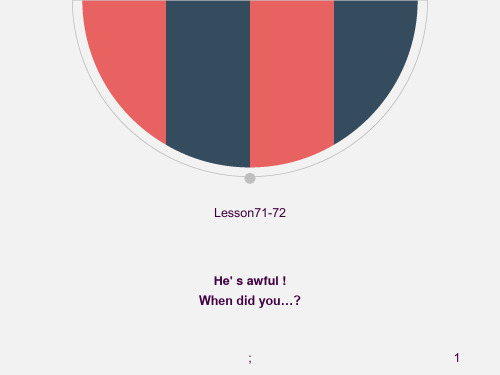
;
20
;
14
本课重点语法 一般过去过的几种基本句型
1.) 肯定句:主语+过去式+其它 如:He telephoned me four times yesterday.
2.) 否定句:主语+didn’t+动词原形+其它 如: He didn’t telephon me four times yesterday.
What's the climate like in your country?
What's the weather like in spring? 2、speak to sb. 与某人说话
May I speak to Pauline, please?
I’d like to speak to Pauline, please. 在电话中回答:This is…. 3、pretend as/to be 假装… 装作…
Lesson71-72
He' s awful ! When did you…?
;
1
New Words:
★awful adj. 让人讨厌的,坏的 awfully adv. 非常(在表示负面的情景中, 可用awfully代替very) 例句:I am awfully (very) sorry.
;
2
★time n. 次(数)- cn.
She pretended herself as her mother.
;
8
;
9
一般过去时(I)
Lesson 68, 70
概念:表示过去某一时间发生的动作或存在的状态,通常以动
语
词的过去式表示,其否定句和各种疑问句靠助动词did构成。
- 1、下载文档前请自行甄别文档内容的完整性,平台不提供额外的编辑、内容补充、找答案等附加服务。
- 2、"仅部分预览"的文档,不可在线预览部分如存在完整性等问题,可反馈申请退款(可完整预览的文档不适用该条件!)。
- 3、如文档侵犯您的权益,请联系客服反馈,我们会尽快为您处理(人工客服工作时间:9:00-18:30)。
73-100课重点词组句型
I 词组
lose one’s way 迷路say… to oneself 心中暗想take out 拿出in fashion 流行的,时髦的last week/month/year 上周、上个月、去年the week/month/year before last 大上周、大上个月、前年have an appointment 有约make a shopping list 写一张购物单
a lot of= lots of 许多at all (用在否定句尾)丝毫、一点、根本
go to the grocer’s 去杂货店have a bath 洗澡
have dinner 吃晚饭go on holiday 度假
stay at home 呆在家all the time 一直,始终
just like…就像…一样to tell you the truth 和你说实话吧
be for sale 供出售、待售be on sale 打折卖
how long 多久、多长(用于现在完成时的句子中)not yet 还没有
move to…搬家到…tomorrow moring/afternoon/evening 明天上午、下午、晚上tomorrow night 明天晚上the day after tomorrow 后天
the day after tomorrow in the moring/afternoon/evening 后天上午、下午、晚上
the night after next 后天晚上next-door neighbour 隔壁邻居
next week/month/year 下周、下个月、明年the week/month/year after next 大下周、大下个月、后年return ticket 往返票next door to 与..为邻
had better 最好in five hour’s time 五小时之后
have a drink 喝点东西plenty of 许多,大量
in an hour’s time 一小时后the other day 几天前
belong to 属于fall downstairs 从楼梯上摔下来
II.句型
1.She doesn’t know London very well. (149)
2.Can you tell me the way to (149)
3.Then he put his hand into his pocket and took out a phrasebook. (149)
4.What size? (153)
5.They were in fashion last year. (153)
6.Do you have an appointment? (157)
7.We haven’t got any meat at all. (161)
8.He is upstairs. (165)
9.I’ m nearly ready. (165)
10.Excuse the mess. (169)
11.Have you just been to the cinema? (173)
12.I have never been there. (173)
13.What is on? (173)
14.When did you bring it to us? (177)
15.They are still working on it (177)
16.I believe that this house is for sale. (181)
17.How long have you lived here? I’ve lived here for 20 years. (181)
18.How much does this house cost? (181)
19.It’s worth every penny of it . (181)
20.Women always have the last word. (181)
21.We’ ll all miss him (185)
22.Please give him my regards. (185)
23.We had better go back to the station. (193)
24.We have got plenty of time. (193)
25.I left a suitcase on the train to London the other day. (197)
26.This case does n’t belong to me! (197)
III. 重点语法
1.buy sb sth = buy sth for sb 注意用for
2. a lot of =lots of + 可数名词、不可数名词均可,通常用在肯定句中
many + 可数名词,通常用在疑问、否定句中
much + 不可数名词,通常用在疑问、否定句中
3.at all 用在否定句尾
4.
5
6.home 之前不加任何冠词和to 例如:go home, arrive home, stay at home 7.have been to 表示某人去过某地,现在已经回来了
have gone to 表示某人去了某地,现在没有回来。
8、ever 当“曾经”讲时可以用于现在完成时的疑问句中。
never 当“从未”讲时用于现在完成时的肯定句中,表示否定意思。
9
10.had better + 动词原形;否定句形式为:had better not do
11.plenty of + 可数、不可数名词均可,常用于肯定句中
12. belong to “属于”不用被动语态,to 后面加名词或代词,而不是动词原形。
